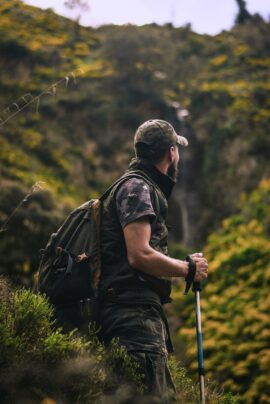
How to Lighten the Load this Hunting Season
Going hunting shouldn’t feel like you’re carrying the weight of the world on your back. But pairing things down to just essentials seems impossible when everything you’re taking is essential. Cutting down weight and traveling light is about making sacrifices, and hopefully not all of these sacrifices will have to come from your bank account. But be warned: weight savings and money savings are not always the best of friends.
Iron and Polymer
You may have a 12 lb. heirloom firearm that you feel is essential to your hunting trip. Whether it’s about family tradition, using a tool that you’re used to, or just going with the most financially sound option, it’s an understandable choice. However, there are some considerations to make before you commit to another season with it.
If you’re not hunting big game, is it feasible to go with a smaller caliber firearm? If it is light, easier to handle, and result in less fatigue from carrying it around, it could be a viable option. If a smaller caliber is just not an option, consider a polymer stock on your firearm.
Going polymer may mean cutting down the weight of a rifle by a third or more. That’s huge. Polymer stock weapons tend to require less maintenance and may be less susceptible to dents or cracks from extreme changes in heat and humidity. That’s not to say that polymer is always the best choice in the long term, but if weight and durability are your primary concerns, you may find it’s a good fit. And, if you find your weapon of choice isn’t as comfortable as you like, you may find that different grips and other accessories may be more readily available. Check out Field and Stream’s recommendations for lightweight hunting rifles if you’re looking to make the change.
Another light option might be to go with a short action cartridge. The shorter bolt of that style of action can mean cutting a considerable amount of weight. Or, consider a switch to a shorter or lower profile barrel if your rifle and/or pocketbook can support that option.
Optics
The higher the power, the lower the weight savings. It’s true that there’s a certain comfort that comes with having more than you need, but there’s considerably more comfort to be had in forgoing a slipped disc. Do you really need 15x or more magnification? Only you can say for certain, but there’s a chance that 3x might be suitable.
Unless you’re able to take different optics outside and really compare them, it can be tough to determine what’s best for you. Backfire has this article with pictures comparing different scopes- which they strangely use to target an unsuspecting horse that’s 33 yards away. I appreciate the helpful comparison, but part of me feels like targeting a horse is a bridge too far.
Did the Lone Ranger ever set his sight on Silver? Did Roy Rogers target Trigger? I mean, Annie Oakley had a horse named Target, but I don’t think that’s what she had in mind. Friends don’t let friends set high powered scopes on friends, Guys. It’s just not done.
Water Weight
You’ve probably heard that you need at least 8 glasses of water per day, and that’s under normal everyday conditions. Those 8 glasses are roughly half a gallon, which is about 4 lbs. of weight to carry. Now, 4 lbs. might not sound like much, but keep in mind that it’s the cumulative effect of the things you carry that determines just how sore you’re going to be the day after your hunting trip. If you’re out in the elements sweating, you’re going to need a lot more than half a gallon of water. Those four pounds could quickly double, triple, or much more depending on the conditions you’ll be in and how long you plan to be out.
There are some ways to deal with water weight that you may have already considered. Hydration backpacks are pretty great and the ones suitable for holding that half gallon of water I mentioned can weigh as little as two pounds. But keep in mind that that’s 2 lbs empty. Remember that 4 lb minimum water weight from earlier? It just turned into 6.
Filters and Purifiers
If you want to forgo carrying too much weight in water, you can make potable water from available outdoor sources using a water purifier. There are a lot of water filter options on the market, and if you’ll be anywhere near to water, some of the more affordable options might be a great way to save weight. Bottle filters, straw filters, and even dissolvable tablets are among the available easy-to-carry options.
Keep in mind that while water filters can take care of most bacteria, a product should be labeled as a “purifier” if it’s capable of killing viruses. And that usually requires a chemical treatment like iodine which can take time to work- and it can taste a little like someone dropped their pocket change in your canteen. So, be prepared for a unique taste experience. Your back will thank you, but your tastebuds may hate you. “You can’t please everyone all the time,” my mother always said.
Check Out this article from Petersen’s Hunting for their filtration and purification picks.
A rant Note on Backpacks
Because backpacks distribute weight more evenly than other kinds of bags, the simple act of owning one seems to be the only weight-saving solution for some. Everyone seems to have that one friend who likes to tout the amazing cardiovascular benefits of wearing a heavy backpack. 45 lbs., on your back? “It’s an amazing workout!” they’ll say. I like to remind these people that silence is also amazing. The more, the better! But I digress, as usual.
Ideally, a backpack should contain no more than ten percent of your weight. For a 150 person, that’s just 15 pounds. You will likely never reach that ideal, but it’s a rule of thumb that will hopefully inspire you to pack light where you can.
That said, pack intentionally, pack light, and don’t overpack. Happy hunting.
Written by: Lanna Perkins, Education Writer

